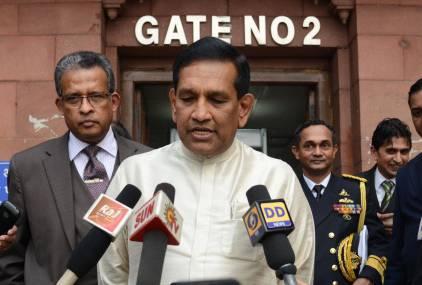[Election rallyi n Sri Lanka ; file photo]
Sri Lanka’s Northern Tamils cannot expect powers to be devolved as long as President Mahinda Rajapaksa is in power, according to Rajitha Senaratne who was, not very long ago, a Minister in his cabinet.
On November 21, he left the ruling coalition along with his colleague Maithripala Sirisena, now the principal challenger of President Rajapaksa in Sri Lanka’s upcoming presidential polls.
“The President never wanted to give anything to the northern people,” he said, alleging that even the development taken up there was solely for the purpose of commissions. “The development has not benefitted the people of the area. They have not been given employment,” he said, less than a month ahead of the January 8 elections. So far neither the joint opposition he is part of, nor the ruling coalition he left, has spoken about substantive devolution of political rights to the country’s Tamil minority in its campaign.
On why he did not speak out when he was still with the government, Mr. Senaratne claimed he had been complaining even then. “Within the government I was struggling to get some social and political reforms implemented. I left the government when I knew nothing will ever come through with this President,” said Mr. Senaratne.

Mr. Senaratne said some of the old timers in the Rajapaksa-led Sri Lanka Freedom Party (SLFP) had been trying to push political reforms such as the abolition of the executive presidency — which has now emerged as one of the key campaign points — a political solution to the Tamil question, good governance “like in India”; independence of the Election Commission, the Public Services Commission and the judiciary. “President Rajapaksa promised to do all that, but never kept his word. I realised there was no point expecting anything from this government, and it is better to have our own process,” said the former Fisheries Minister.
Religious freedom
Charging the Rajapaksa government of “actively promoting ethnic disharmony”, he said the government supported extremist Sinhala-Buddhist organisations hoping to win elections “over pseudo patriotism”.
The June 2014 religious clashes between Buddhists and Muslims in Aluthgama, a coastal town south of Colombo, where three people died and 80 were injured, he suggested, were another indication of state patronage for the hard-line Bodu Bala Sena (Buddhist Power Force) charged with provoking the clash.
“No legal action was taken against any of the culprits after the Aluthgama incident,” said Mr. Senaratne, one of the few in the government then to publicly condemn the Buddhist hard-liners.
‘Family rule’
President Rajapaksa — a close ally and comrade of Mr. Senaratne for nearly 40 years — had been a “wonderful person” earlier but, following the end of the war in 2009, allowed his family to dictate terms to the government, Mr. Senaratne said, referring to the alleged role played by the President’s brothers Gotabaya Rajapaksa, the Defence Secretary, Basil Rajapaksa, the Economic Development Minister and the President’s son, Namal Rajapaksa, a parliamentarian. Chamal Rajapaksa, another brother of the President, is the Speaker in Parliament. “And then there are the numerous henchmen. Some people were singing his praise and calling him a king, which Mr. Rajapaksa began taking very seriously.”
The atmosphere for Ministers like him was stifling, with the “family’s domination” manifesting in budgetary allocations, he said, pointing to the near-70 per cent budgetary allocation to portfolios held by the family members. “Only the remaining 28 per cent were allocated for the rest of the ministries, including health, education and fisheries.”
Even that funding, he said, was channelled through the Economic Development Ministry forcing senior Ministers to “run behind Basil begging for the money.”
India-Sri Lanka ties
India had virtually given up on President Rajapaksa after many unkept promises, the former Minister said. “There is no relationship between the countries now because of that. Mr. Rajapaksa’s attitude is very dictatorial, but Indian leaders tend to be democratic and hence there is a huge gap there.”
Despite all the differences and the apparently close contest, the Maithripala camp is clear it will protect their opponent from the international powers that may victimise him over allegations of war crimes. The joint opposition, Mr. Senaratne said, would strengthen domestic mechanisms and “settle our matters in our own country”.
The Hindu
